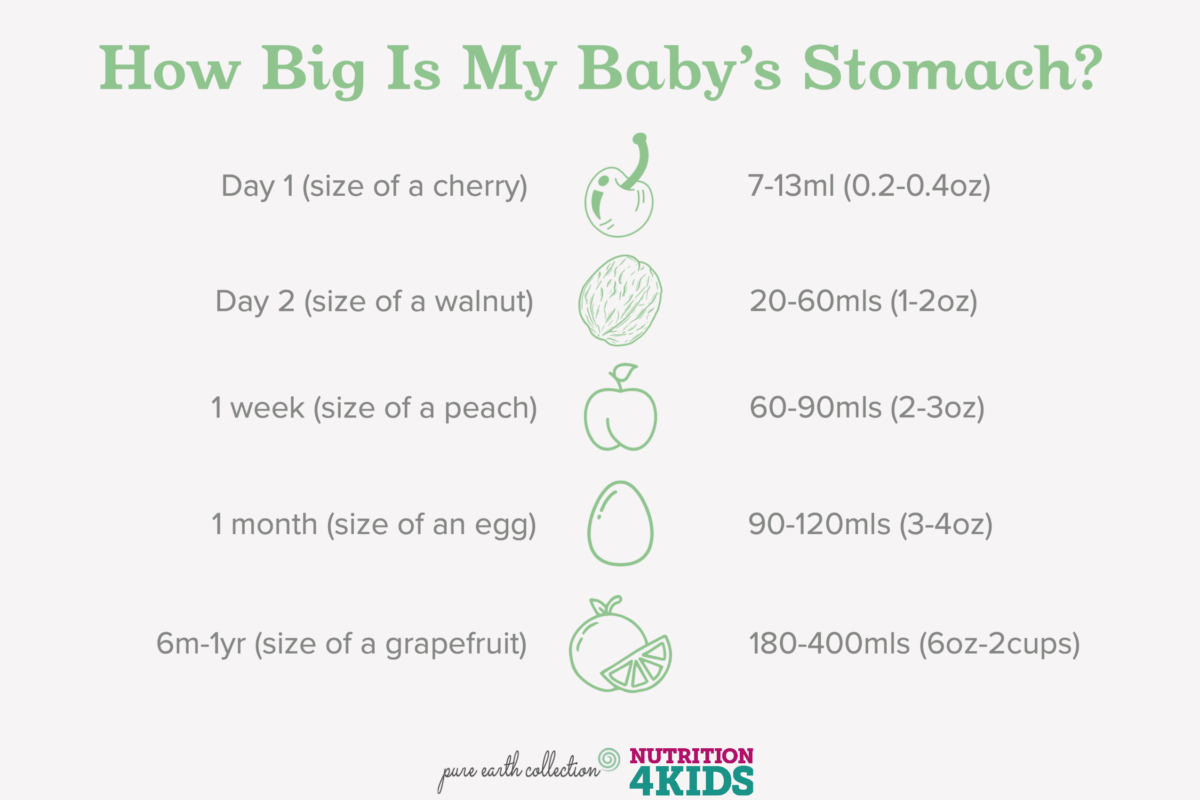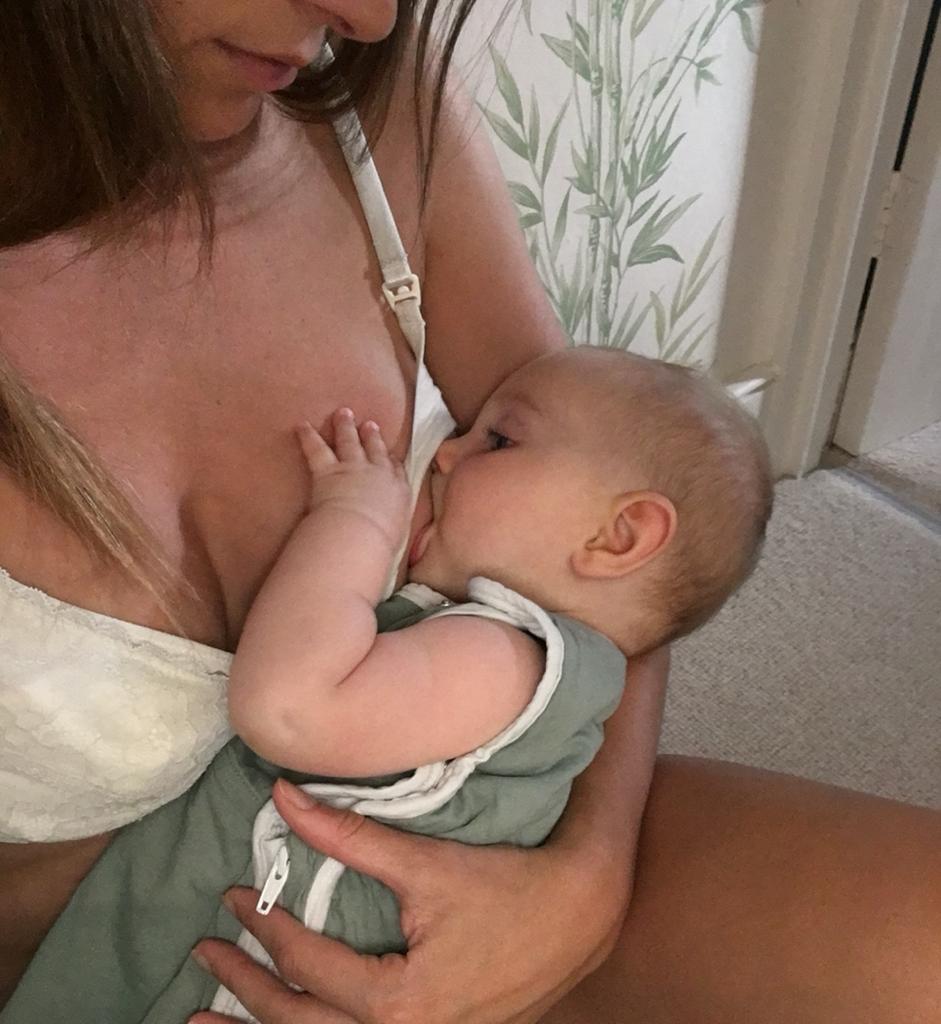Guest blog post written by Dr. Kirsty Porter, A Trusted Expert Children’s Dietitian and founder of Nutrition4Kids.
Congratulations on the birth of your baby. You are now starting the feeding journey and may be considering the bests way to go about it. Below is a 101 on feeding your baby in the first months of life covering a few useful facts and some commonly asked questions.
It’s useful to start by understanding just how tiny newborn tummies are. Newborn babies only need a small amount of milk to start within their first few days. Most newborns feed every 2-3 hours and as they get older and their tummies can hold more milk, this may increase to every 3-4 hours. Eventually, your baby will settle into a more predictable feeding routine and go longer stretches at night without feeds.

How should I feed my baby? Here are the three main ways to milk-feed your infant:
- Exclusive breastfeeding
- Combi feeding- breast and formula
- Formula feeding
This is a personal decision for you and your baby. We know that breastfeeding is recommended globally by the WHO and has many benefits such as the ability to adapt to the requirements of your baby, and support immunity and gut health. However, if breastfeeding doesn’t work for you or you chose not to there are a number of infant formulas available in the UK. The NHS website (click here) provides a good summary of each type to help you choose a formula. All infant formulas are regulated by law and have to contain certain levels of key nutrients including vitamins and minerals. This means that they are all pretty similar in their nutritional composition.
Breast milk or formula is exclusive until around 6 months of age when the weaning process begins through the introduction of solids. Breastfeeding can continue to the age of 2, or for as long as you and the baby wish. According to NHS guidelines breast milk or infant formula should be a baby’s main drink during the first year of life. Cow’s milk and other substitutes should not be introduced as a main drink until after 1 year.
How much milk is enough for my baby?
You can use the chart above as a rough guide of how much you can expect your babies to take at each feed. But remember, babies are very intuitive when it comes to feeding. They will naturally start to decrease the amount of milk they are consuming when solids begin. We promote responsive feeding, which is when you allow your baby to tell you when they have had enough or would like more. Remember that your baby knows their own appetite. Trust this rather than trying to override it (i.e., pushing them to drink more milk than they need).
I always try to put this into context in relation to the size of your baby’s stomach:
- 1-2 days cherry – can hold 7-13mls (0.2-0.4oz)
- 3-4 days walnut – can hold 20-60mls (1-2oz)
- 5-7 days apricot – can hold 60-90mls (2-3oz)
- 1-month egg – can hold 90-120mls (3-4oz)
- 6 months -1 year grapefruit 180-400mls (6oz-2cups)
Your baby will also show you if they are getting enough milk by gaining the appropriate amount of weight which is usually entered in your personal child health record. If they have been unwell or not feeding as much their weight gain can be reduced but once they are feeding better and recovered this will resolve. If their growth continues to decline you can get in touch with a healthcare professional like your GP or health visitor.
When will I know when my baby needs a feed?
Your baby has a few ways of letting you know when they’re getting hungry. They may:
- get restless
- suck their fist or fingers
- make murmuring sounds
- turn their head and open their mouth (rooting)
It’s best to try and feed your baby during these early feeding cues as a crying baby can be difficult to feed.
Breastfeeding
The NHS provides advice on the breastfeeding journey with your baby. The fluid your breasts produce in the first few days after birth is called colostrum. It’s thick and usually a golden yellow colour. It’s a very concentrated food, so your baby will only need a small amount, about a teaspoonful, at each feed. In the first week, your baby may want to feed very often. It could be every hour in the first few days. They’ll begin to have fewer, but longer feeds once your breasts start to produce more mature milk. The more you breastfeed, the more your baby’s sucking will stimulate your supply and the more milk you’ll make. We recommend you feed your baby as often as they want and for as long as they want. As a very rough guide, your baby should feed at least 8 to 12 times, or more, every 24 hours during the first few weeks. It’s fine to feed your baby whenever they are hungry, when your breasts feel full or if you just want to have a cuddle. It’s not possible to overfeed a breastfed baby.
Formula-fed babies
The NHS also provides guidance suggesting that formula-fed newborns need quite small amounts of formula to start with. By the end of their first week, most will need around 150 to 200ml per kilo of their weight a day until they’re 6 months old. Babies may need around 600ml per day between 7-9 months and this will drop down to around 400ml between 10-12 months. This amount will vary from baby to baby. Although most babies settle into a feeding pattern eventually, they vary in how often they want to feed and how much they want to drink.
Feed your baby when they show signs that they want it. Babies tend to feed little and often, so they may not finish their bottles. Having a big feed does not mean your baby will go longer between feeds. The amount of formula may change if your baby is unwell, in pain due to teething, or having a growth spurt.
When your baby has had enough, they may:
- close their fists when they are full
- older babies will give more obvious clues like turning away, blocking their mouth or hiding their face
Does my baby need any nutritional supplements?
If your baby is exclusively breastfed
It’s recommended that breastfed babies are given a daily vitamin D supplement from birth, regardless if you are taking a supplement containing vitamin D yourself.
- From birth, they need 8.5-10mgs vitamin D
- From 6 months need vitamin A, C & D supplements.
For bottle-fed babies
Babies having 500ml (about a pint) or more of their first infant formula a day shouldn’t be given vitamin supplements. This is because the first infant formula already contains vitamin D and other nutrients.
- Only when <500mls of formula a day (usually around 10 months) do need vitamin A, C & D supplements.
About the author: Dr Kirsty Porter has been helping parents with feeding kids with confidence, stress-free mealtimes and happy healthy eaters. For more information on children’s nutrition, weaning, food allergies, fussy eating and much more, visit www.nutrition4kidsni.com where you will find 1:1 support, online courses and webinar workshops.

